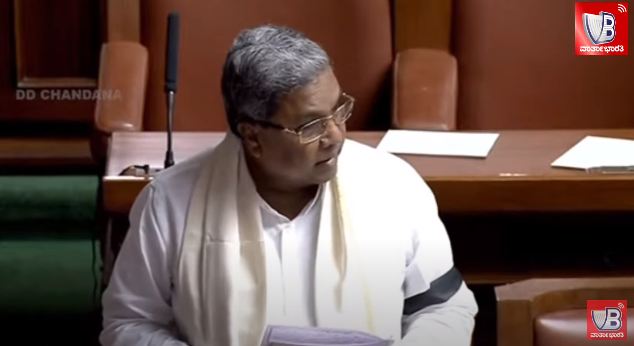Bengaluru, Feb 14: Congress legislators in Karnataka wore black band on Monday during the Governor's address to the joint sitting of the state legislature, in protest against the hijab row, accusing the BJP government's role in it, and the rejection of social reformer Narayana Guru's tableau during the Republic Day parade in New Delhi.
The principal opposition party in the state assembly also demanded immediate action against Minister for Rural Development and Panchayat Raj K S Eshwarappa for his recent statement claiming that 'Bhagwa dhwaj' (saffron flag), may become the national flag some time in the future.
"We are protesting by wearing a black band because the hijab issue is their (BJP government) creation, they are the one's who sent students (to colleges) with saffron shawls. We are not saying it, they have admitted it, Eshwarappa (minister) has admitted," Leader of Opposition in the assembly Siddaramaiah said.
Speaking to reporters here, the former chief minister said the black band is also in protest against the rejection of Narayana Guru's tableau during the Republic Day parade.
Also, demanding action and a criminal case against Eshwarappa for his statement that the saffron flag may fly at the Red Fort in place of the national flag, some time in the future, Siddaramaiah said, patriots don't speak such things.
The 10-day joint session of Karnataka Legislature that will go on till February 25, began with Governor Thaawar Chand Gehlot addressing the joint sitting of members of both Legislative Assembly and the Council on the first day.
State Congress President D K Shivakumar too hit out at the ruling BJP on the hijab row, accusing it of using students for the sake of politics.
He said his party wore a black band during the Governor's address as a mark of protest, as he alleged that there is no law and order, and the government officials including police are also being used for politics.
Shivakumar also requested Chief Minister Basavaraj Bommai and the Governor to dismiss Eshwarappa from the state cabinet and said a sedition case should be booked against him.
Let the Truth be known. If you read VB and like VB, please be a VB Supporter and Help us deliver the Truth to one and all.
Kozhikode (PTI): Violence erupted overnight at various places across Kerala, particularly in northern districts, following the announcement of local body election results, police said.
In Eramala in Kozhikode district, tension prevailed throughout the night after the Indira Gandhi Bhavan, a Congress office, was allegedly attacked by CPI(M) workers.
According to an FIR registered at Edachery police station, around 200 people marched towards the Congress office carrying dangerous weapons and vandalised the building, causing damage estimated at around Rs five lakh.
A statue of late prime minister Indira Gandhi was also damaged in the attack, police said. Soon after, UDF activists gathered at the spot, further aggravating the situation.
However, with the deployment of additional police personnel, the situation was brought under control, an officer said.
Police said another violent incident was reported at Marad, where stones were allegedly pelted at a UDF victory procession, leaving several persons injured.
In Sultan Bathery in Wayanad district, police registered a case after a car carrying a UDF activist and his family members was allegedly attacked by around 40 CPI(M) workers, an official said.
Sultan Bathery police also booked UDF activists in a separate incident for allegedly attacking a CPI(M) worker who objected to the bursting of crackers near his house, the officer said.
In Panoor in Kannur district, houses of several Muslim League activists were allegedly attacked by CPI(M) workers. Vehicles parked at the houses were also damaged.
According to Panoor police, the violence broke out after a UDF victory rally was allegedly stopped by CPI(M) workers armed with swords and daggers. Some UDF leaders sustained injuries in the clash.
Clashes were also reported between UDF and LDF workers at Ulikkal in Kannur district, though police intervention brought the situation under control later in the night, an officer in the Ulikkal police station said.
In Bedakom in Kasaragod district, an LDF victory march turned violent after CPI(M) activists allegedly intercepted UDF workers passing through the area. Some policemen who intervened suffered minor injuries, an officer said.
Similar violence was reported from Neyyattinkara in Thiruvananthapuram district following clashes between CPI(M) and BJP workers. Police said workers from both sides sustained minor injuries and were admitted to hospitals. Cases will be registered after formal complaints are received, police said.





